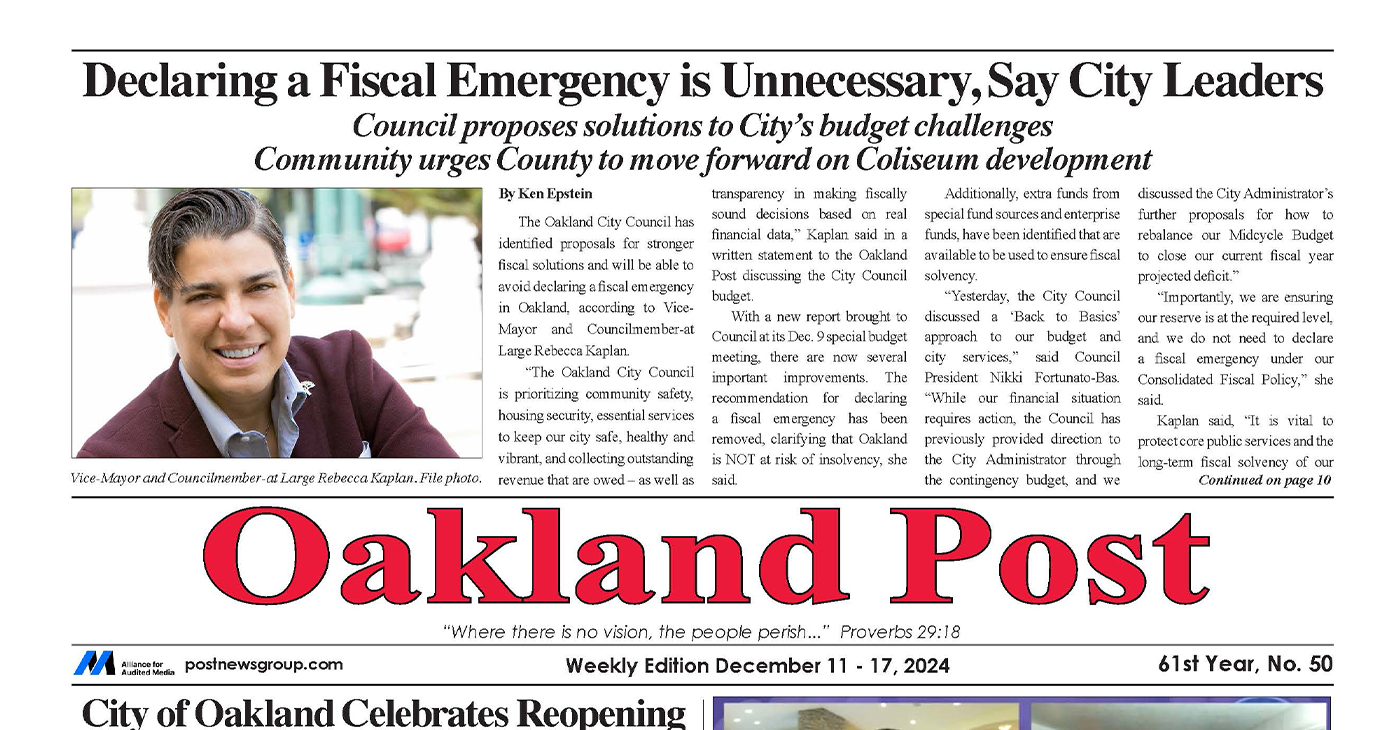Opinion
Op Ed: There’s No Such Thing as a “Public Charter School”
By Ann Berlak
This year, more than a quarter of Oakland’s 49,000 students are attending one of its nearly 40 charter schools, far more per capita than anywhere else in the state.
Is this something for Oaklanders to boast about?
Not long ago I visited a school in Oakland to read to third graders on “Literacy Day.” On the way to the classroom I asked my guide if this was a charter or a public school. The immediate and decisive response: “We’re a public charter school.”
On June 14th the LA Times informed the public: “Charters are independently operated, free public schools.”
The California Department of Education makes no bones about it: “A charter school is a public school.”
However, the term “public charter school” was developed by a PR firm to reframe the way we understand schooling in relationship to “public” and to democracy.
The campaign has been wildly successful. However, though the term “public charter school” is increasingly ubiquitous, charters are not public schools.
Public institutions—schools, libraries, zoos—are, at least in theory, funded by taxes from all the people in its jurisdiction—local, state and national—and are held accountable to and by those people through that fundamental process we in a democracy call voting.
Most public schools are accountable to an elected school board made up of community members. Residents of that community have the right to be present at Board meetings, weigh in on votes and debates, and access public financial documents.
Charter schools are run by executive boards, committees or corporations whose members often live outside the community in which they are located and are not accountable to parents or the taxpayers/community members who fund them.
If you don’t like what your traditional public school is doing, you can make your voice heard by addressing administrators, voting for new leadership or taking a leadership role yourself. If you don’t like what your child’s charter school is doing and you express yourself, you may be asked to leave. There is no democratic mechanism for spearheading policy change.
Public institutions are the motors of democracy. Their purpose is to promote and preserve the fundamental values of a democratic society: liberty, equality and the public welfare or common good.
Public schools recognize that the welfare of everyone’s children and grandchildren is intimately linked to the welfare of all. Through support and oversight by the community, public schooling is intended to serve the common good and preserve fundamental qualities that sustain democracy beyond getting students “college and career ready.” If public schools have not always lived up to their promise then it is necessary to redouble our efforts to have them do so, not to abandon them.
When students leave public schools for charter schools they take their per pupil expenditures –which in California averaged $9,794 last year–with them, leaving public schools with less revenue but the same overhead.
The federal government also spends millions on charters at the expense of public schools. Taxpayers paid one consulting firm nearly $10 million to the U.S. Department of Education Charter Schools. That’s $10 million fewer federal dollars for public schools.
The law forbids local districts, which in California are the main authorizers for new charters, from taking into account the potentially crippling impact of new charters on district financing when considering approving new schools.
So even if you find an excellent charter to send your own child to, you are reducing the chances of every student remaining in the public school having their own excellent education.
Charter schools’ claim they enhance democracy is disingenuous.
The highly touted freedom of individual parents to choose their child’s school comes at the heavy price of reducing two other essential functions of democracy: providing for the general welfare of a society that requires well funded public schools and insuring equal opportunity for all children.
Competing with traditional public schools for space and funding reduces the quality of the remaining public schools, and ignores patterns of clear advantage for the children of savvy parents, thus assuring that some children will be better schooled than others.
Being publicly funded, charters cannot be considered private. However, their private governance and their marginalization of fundamental democratic values disqualify them as public.
The most accurate label for charters is “Publicly–funded private schools.” Don’t let them abscond with our language. There is no such thing as a public charter school.
Ann Berlak is an author and has worked as a teacher and teacher educator. She lives in Oakland.
Activism
Oakland Post: Week of December 11 – 17, 2024
The printed Weekly Edition of the Oakland Post: Week of December 11 – 17, 2024

To enlarge your view of this issue, use the slider, magnifying glass icon or full page icon in the lower right corner of the browser window. ![]()
Activism
Oakland Post: Week of December 4 – 10, 2024
The printed Weekly Edition of the Oakland Post: Week of December 4 – 10, 2024, 2024

To enlarge your view of this issue, use the slider, magnifying glass icon or full page icon in the lower right corner of the browser window. ![]()
Activism
COMMENTARY: PEN Oakland Entices: When the News is Bad, Try Poetry
Strongman politics is not for the weak. Here in the U.S., Donald Trump is testing how strongman politics could work in the world’s model democracy.

By Emil Guillermo
As the world falls apart, you need more poetry in your life.
I was convinced on Tuesday when a weak and unpopular president of South Korea — a free nation U.S. ally — tried to save himself by declaring martial law.
Was it a stunt? Maybe. But indicative of the South Korean president’s weakness, almost immediately, the parliament there voted down his declaration.
The takeaway: in politics, nothing quite works like it used to.
Strongman politics is not for the weak. Here in the U.S., Donald Trump is testing how strongman politics could work in the world’s model democracy.
Right now, we need more than a prayer.
NEWS ANTIDOTE? LITERATURE
As we prepare for another Trump administration, my advice: Take a deep breath, and read more poetry, essays and novels.
From “Poetry, Essays and Novels,” the acronym PEN is derived.
Which ones to read?
Register (tickets are limited) to join Tennessee Reed and myself as we host PEN OAKLAND’s award ceremony this Saturday on Zoom, in association with the Oakland Public Library.
Find out about what’s worth a read from local artists and writers like Cheryl Fabio, Jack Foley, Maw Shein Win, and Lucille Lang Day.
Hear from award winning writers like Henry Threadgill, Brent Hayes Edwards and Airea D. Matthews.
PEN Oakland is the local branch of the national PEN. Co-founded by the renowned Oakland writer, playwright, poet and novelist Ishmael Reed, Oakland PEN is special because it is a leader in fighting to include multicultural voices.
Reed is still writing. So is his wife Carla Blank, whose title essay in the new book, “A Jew in Ramallah, And Other Essays,” (Baraka Books), provides an artist’s perspective on the conflict in Gaza.
Of all Reed’s work, it’s his poetry that I’ve found the most musical and inspiring.
It’s made me start writing and enjoying poetry more intentionally. This year, I was named poet laureate of my small San Joaquin rural town.
Now as a member of Oakland PEN, I can say, yes, I have written poetry and essays, but not a novel. One man shows I’ve written, so I have my own sub-group. My acronym: Oakland PEOMS.
Reed’s most recent book of poetry, “Why the Black Hole Sings the Blues, Poems 2007-2020” is one of my favorites. One poem especially captures the emerging xenophobia of the day. I offer you the first stanza of “The Banishment.”
We don’t want you here
Your crops grow better than ours
We don’t want you here
You’re not one of our kind
We’ll drive you out
As thou you were never here
Your names, family, and history
We’ll make them all disappear.
There’s more. But that stanza captures the anxiety many of us feel from the threat of mass deportations. The poem was written more than four years ago during the first Trump administration.
We’ve lived through all this before. And survived.
The news sometimes lulls us into acquiescence, but poetry strikes at the heart and forces us to see and feel more clearly.
About the Author
Emil Guillermo is a journalist and commentator. Join him at www.patreon.com/emilamok
-

 Activism4 weeks ago
Activism4 weeks agoOakland Post: Week of November 20 – 26, 2024
-

 California Black Media3 weeks ago
California Black Media3 weeks agoCalifornia to Offer $43.7 Million in Federal Grants to Combat Hate Crimes
-

 Activism4 weeks ago
Activism4 weeks agoAn Inside Look into How San Francisco Analyzes Homeless Encampments
-

 Black History3 weeks ago
Black History3 weeks agoEmeline King: A Trailblazer in the Automotive Industry
-

 California Black Media3 weeks ago
California Black Media3 weeks agoCalifornia Department of Aging Offers Free Resources for Family Caregivers in November
-

 California Black Media3 weeks ago
California Black Media3 weeks agoGov. Newsom Goes to Washington to Advocate for California Priorities
-

 Activism3 weeks ago
Activism3 weeks agoOCCUR Hosts “Faith Forward” Conference in Oakland
-

 #NNPA BlackPress4 weeks ago
#NNPA BlackPress4 weeks agoPRESS ROOM: Clyburn, Pressley, Scanlon, Colleagues Urge Biden to Use Clemency Power to Address Mass Incarceration Before Leaving Office
























































